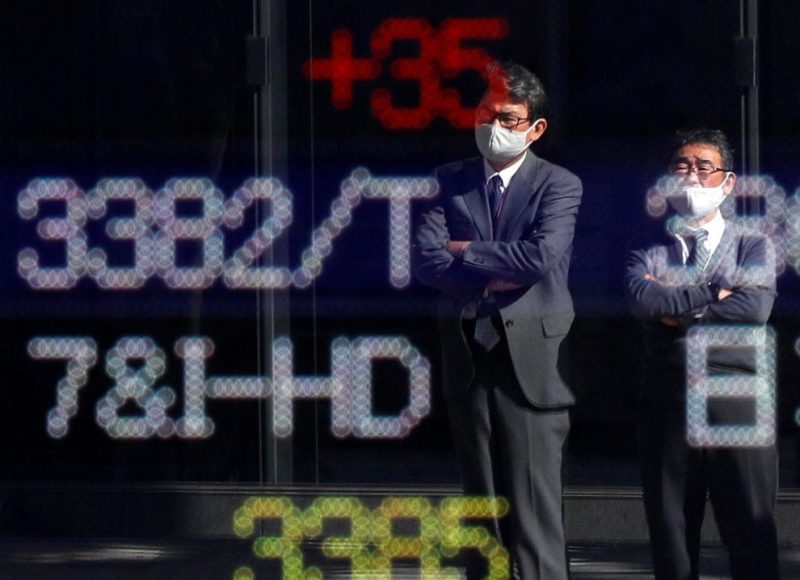Most Asian markets fell on Friday, unnerved by the return of Covid restrictions in Shanghai after new infections were reported, while millions in the city face mass testing over the weekend.
Investors were also wary ahead of US inflation data later in the day, which could impact the Federal Reserve’s policy settings.
But China stocks rose on Friday, ending their strongest week in nearly 16 months on a surge of buying by foreign investors, while tech firms in Hong Kong overcame broader equity market weakness on hopes for easing regulatory pressure.
At the close, the Shanghai Composite index was up 1.42% at 3,284.83. The blue-chip CSI300 index was also up 1.52%, rising 3.65% for the week – its biggest weekly gain since early February 2021.
In Hong Kong, the Hang Seng index slipped 62.87 points, or 0.29%, to 21,806.18 amid broad regional weakness ahead of the US inflation data.
Automotive shares and the new energy vehicles sector were among the biggest A-share winners, rising 4.26% and 4.16%, respectively, on the back of an 8.19% rise in electric vehicle maker BYD Co Ltd and battery giant Contemporary Amperex Technology Co Ltd (CATL) which gained 5.25%.
Foreign Buying
The sharp rise in A-shares was driven by foreign buying, with Refinitiv data showing inflows of nearly 18.2 billion yuan through the Stock Connect programme’s Northbound leg, the largest daily inflow since December 9, 2021.
The smaller Shenzhen index ended up 1.94% and the start-up board ChiNext Composite index was higher by 2.25% as hopes for easing policy restrictions boosted sentiment.
Those hopes also lifted tech shares in Hong Kong, with the Hang Seng Tech index swinging around from a 3% drop in morning trade to end 1.62% higher – up nearly 10% on the week.
China’s central leadership has given billionaire Jack Ma’s Ant Group a tentative green light to revive its initial public offering (IPO), two sources with knowledge of the matter said.
Approval of an Ant IPO “would just signal that this regulatory pressure that we’ve experienced for 12-plus months is unwinding, and that would be a very big statement,” Andy Maynard, head of equities at China Renaissance in Hong Kong, said.
ALSO SEE: Tesla’s China Production Could Fall 33% in Second Quarter
Stocks Down Across the Region
MSCI’s Asia ex-Japan stock index was weaker by 0.83%, while Japan’s Nikkei index fell 1.49%.
The Nikkei slipped to 27,824.29, below the key psychological level of 28,000 and retreating from a near five-month peak of 28,389.75 hit on Thursday. But the benchmark rose 0.23% this week in its fourth straight weekly gain.
The broader Topix dropped 1.32% to 1,943.09, but rose 0.51% for the week.
Japanese investors fear inflation data will send US stocks lower and that they would not be able to react until markets in Tokyo reopen on Monday, a market participant with a domestic securities company said.
Stocks also fell in Jakarta by 1.5% and were on track for a weekly fall after three consecutive weeks of gains.
Indonesia raised its maximum export tax for crude palm oil by 44%, but reductions in another levy are expected to reduce overall fees to send palm oil products overseas and encourage export shipments.
Stocks in Seoul also dropped over 1% and were set to close the week with their worst performance in nearly five months, weighed by rising inflation worries and a truckers strike that is threatening to severely curtail shipments of raw materials for semiconductors and petrochemical products.
Benchmark indexes in Malaysia, Singapore, Philippines, Taiwan and Thailand also fell between 0.5% and 3%.
Australia, India Also Slip
Australian shares ended the week in red to mark their biggest weekly fall in two years amid a global equities sell-off on weak commodity prices, with investors refraining from placing big bets ahead of US inflation data due later in the day.
The S&P/ASX 200 index ended 1.25% lower at 6,932.0 on Friday. For the week, the benchmark lost 4.2% and snapped its third weekly gain.
Indian shares fell 1% on Friday and kept benchmark indexes on course for their first weekly drop in four, as investors across the globe worried about the impact of aggressive monetary policy tightening on economic growth.
The NSE Nifty 50 index dropped 1.68% to 16,201.80 at 10.42 GMT and the S&P BSE Sensex fell 1.84% to 54,303.44, hammered by losses in technology and metal stocks.
“Global stock markets are seeing negative moves post the ECB meeting. Until the next US Fed outcome, Indian markets could remain directionless,” said Narendra Solanki, head of equity research (fundamental) at Anand Rathi Investment Services.
“Comments on inflation and the upcoming Fed meeting will be key data points that will help markets decide next moves.”
• Reuters with additional editing by Jim Pollard
ALSO on AF:
Shanghai Expands Lockdown, Mass Testing for Most of City
Russia Earning More From Energy Than Before Invasion: US
China Factory Gate Inflation Rises at Slowest Pace in 14 Months
























